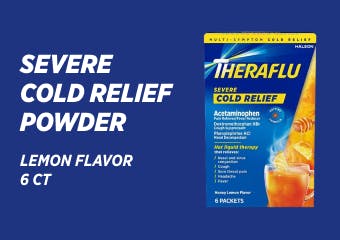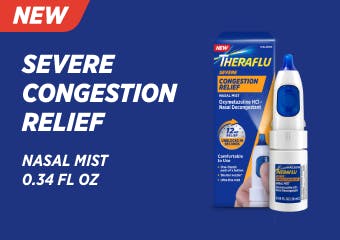There are two different types of coughs: productive—also known as a wet cough—and unproductive—also known as a dry cough.5 A wet cough helps to clear mucus from your lungs’ airways, while a dry cough is caused by the irritation or inflammation of the airways, rather than mucus.5 A dry, unproductive cough may develop after exposure to an irritant or at the end of a cold.5 It’s important to understand the difference between these types because they can be treated differently.
Read on to learn some remedies for a dry cough so that you can feel better, faster.
How to Treat Dry Cough with OTC Medication
Coughing is the body’s way of clearing air passages of foreign substances and mucus. Generally, you should not try to suppress your natural instinct to cough.1 However, there are times when a cough is more severe, making it difficult to breathe and preventing you from getting a good night’s rest.1 When a dry cough is disruptive to your life, there are some OTC medications, like these products from Theraflu, that may help you find cough relief due to a cold.
OTC medicines are available at drugstores without a prescription from a doctor. There are two main types of OTC cough medicine: expectorants and antitussives, which are cough supressants.2 Antitussives relieve your cough by blocking your cough reflex, while expectorants help to thin out mucus.2 If you’re suffering from a dry cough due to a cold, a cough suppressant may work best and can allow your inflamed airways to heal and become less irritated.1,4 Learn how Theraflu Cough Relief can help you manage your cough with a combination of active ingredients.
Cough drops may help to soothe an irritated throat, but they have little effect on the coughing mechanism.1
Home Remedies for Dry Cough
In addition to taking OTC medication to manage your dry cough, there are a number of ways to relieve a cough at home. Try any one of these home remedies to help soothe your dry cough:
- Drink lots of fluids to keep from getting dehydrated. A dry, hacking cough may respond to honey in hot water, tea and lemon juice.1 Eight, 8-ounce glasses of water a day are recommended to maintain proper hydration.4
- In fact, honey alone may be an effective cough suppressant.3 It may be as effective as dextromethorphan, a common OTC cough suppressant ingredient.3 Children with upper respiratory tract infections were given 2 teaspoons of honey before bed and it seemed to reduce nighttime coughing and improve sleep.3
- Avoid exposure to inhaled irritants than can cause a dry cough.1 Smoke, dust, chemicals and other pollutants can exacerbate a dry cough, and limiting your exposure can give your irritated airways a chance to heal.1 You may want to wear a face mask if you cannot avoid exposure, as it may limit the amount of pollutants you inhale.1
- If your dry cough is caused by GERD or acid reflux, take steps to manage those conditions. Don’t eat right before bedtime, avoid foods that trigger acid reflux and sleep with your head elevated.4
- Use a humidifier to help soothe a dry, irritated airway.4
- If your dry cough is caused by smoking cigarettes, look into quitting. Cigarettes are the leading cause of chronic cough and can cause damage throughout your body.4
A dry cough can be painful and can disrupt your sleep. Thankfully, there are remedies for a dry cough than can help you get relief.





